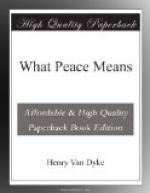I. It is the only faith that lifts man’s soul, which is immortal, above his body, which is perishable. It raises him out of the tyranny of the flesh to the service of his ideals. It makes him sure that there are things worth fighting and dying for. The fighting and the dying, for the cause of justice and liberty, are sacrifices on the Divine altar which shall never be forgotten.
II. The faith in immortality carries with it the assurance of a Divine reassessment of earth’s inequalities. Those who have suffered unjustly here will be recompensed in the future. Those who have acted wickedly and unjustly here will be punished. Whether that punishment will be final or remedial we do not know. Perhaps it may lead to the extinction of the soul of evil, perhaps to its purifying and deliverance. On these questions I fall back on the word of God: “The wages of sin is death, but the gift of God is eternal life in Christ Jesus our Lord.”
III. The faith in immortality brings with it the sense of order, tranquillity, steadiness and courage in the present life. It sets us free from mean and cowardly temptations, makes it easier to resist the wild animal passions of lust and greed and cruelty, brings us into eternal relations and fellowships, makes us partners with the wise and good of all the ages, ennobles our earthly patriotism by giving us a heavenly citizenship. Yea, it knits us in bonds of love with the coming generation. It is better than the fountain of youth. We shall know and see them as they go on their way, long after we have left the path. The faith in immortality sets a touch of the imperishable on every generous impulse and unselfish deed. It inspires to sublime and heroic virtues,—spiritual splendours,—deeds of sacrifice and suffering for which earth has no adequate recompense, but whose reward is great in heaven. Here is the patience of the saints, the glorious courage of patriots, martyrs, and confessors, something more bright and shining than secular morality can bring forth,—a flashing of the inward light which fails not, but grows clearer as death draws near. What noble evidences of this come to us out of the great war.
“Are you in great distress?” asked a nurse of an American soldier whose legs had been shot away on the battle-field. “I am in as great peace,” said he, “through Jesus my Lord, as a man can possibly be, out of Paradise.”
A secretary of the Y.M.C.A., the night before he was killed, wrote to his father: “I have not been sent here to die: I am to fight: I offer my life for future generations; I shall not die, I shall merely change my direction. He who walks before us is so great that we cannot lose Him from sight.”
A simple French boy, grievously wounded, is dying in the ambulance. He is a Protestant The nurse who bends over him is a Catholic sister. She writes down his words as they fall slowly from his lips: “O my God, let Thy will be done and not mine. O my God, Thou knowest that I never wished war, but that I have fought because it was Thy will; I offered my life so that peace might prevail. O my God, I pray for all my dear ones, ... father, mother, brothers, sisters. Give a hundredfold to those nurses for all they have done for me. I pray for them one and all.”




